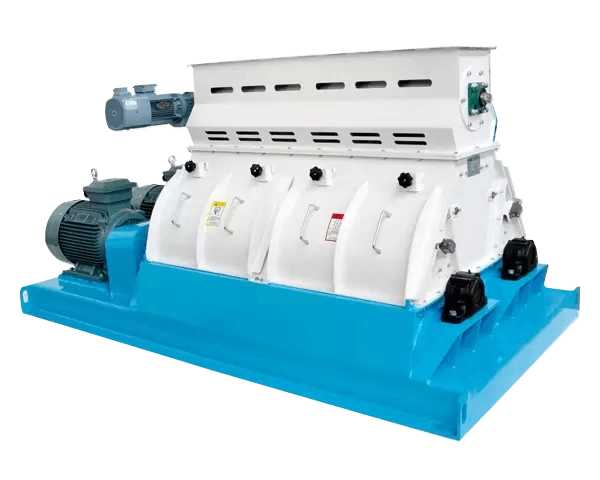In the rapid development of animal husbandry and feed production today, feed quality and cost control have become the focus of attention of farmers and feed manufacturers. As an important equipment to reduce feed production costs and improve feed quality, feed grinder plays a vital role. It can not only grind various raw materials into suitable particle sizes, but also improve the palatability and digestibility of feed, thereby improving the efficiency and profitability of animal husbandry.
The main working principle of feed grinder is to grind materials under the action of mechanical force, usually including crushing, tearing, extrusion, shearing and other forms. According to different working principles, feed grinders can be divided into hammer type, roller type, blade type and other types.
The judgment of grinding effect is generally based on the following aspects:
Grinding particle size: that is, the particle size of the material after being crushed, usually expressed by the mesh number of the screen.
Particle size uniformity: The ideal grinding effect requires that the particle size of the material after crushing is relatively consistent to avoid the separation of large and small particles.
Output: The amount of material that can be processed per unit time is directly related to production efficiency.
Energy consumption: The energy consumed in the crushing process affects the production cost.
Dust and noise: The dust and noise generated during the crushing process are also one of the criteria for measuring its environmental performance.
Particle size control: Modern feed crushers are usually designed with different requirements for feed particle size of different livestock and poultry in mind. By replacing screens of different specifications or adjusting the crushing structure inside the machine, it is easy to achieve the production of multi-specification particle sizes. Some high-end feed crushers are even equipped with automatic adjustment systems that can monitor and adjust the particle size in real time during the production process.
Uniformity guarantee: A good feed crusher design can ensure a high material pass rate and crushing uniformity. For example, the hammer mill uses high-speed rotating hammers to make the material fully hit and collide in the crushing chamber, thereby achieving a better crushing effect.
Output and energy consumption: The output and energy consumption of the feed crusher are important indicators for evaluating its efficiency. A high-quality feed crusher must have the characteristics of high output and low energy consumption while ensuring the crushing effect. Generally speaking, hammer and roller mills have higher output when crushing coarse materials, while blade mills perform better when crushing fine materials.
Dust and noise control: Dust and noise problems during the crushing process are important factors affecting the working environment and meeting environmental protection requirements. Effective dust removal systems and sound insulation design are important parts of modern feed grinders that cannot be ignored.

Material properties: Physical properties such as material hardness, moisture content, viscosity and elasticity have a significant impact on the crushing effect.
Equipment condition: Including the maintenance status, wear degree, blade sharpness, etc. of the feed grinder.
Operation method: Correct operation method and process flow are crucial to the crushing effect.
Environmental factors: Such as temperature, humidity, etc. will also affect the crushing effect.
Regular maintenance and inspection: This includes checking whether the screen is blocked, whether the blade is worn, etc., as well as lubricating the equipment and replacing wearing parts on time.
Reasonable selection of crusher model: According to different material characteristics and production needs, choose a suitable crusher model.
Adjust operating parameters: such as appropriately adjusting the gap between the hammer and the screen, controlling the feed speed and moisture content of the material, etc.
Strengthen operator training: ensure that operators are familiar with the equipment performance and operating procedures, and use the feed grinder in the correct way.
Use professional auxiliary equipment: such as pre-crushers, grading equipment, etc., to further improve the crushing efficiency and quality.
In general, the crushing effect of a feed grinder depends on many factors, including the design of the equipment itself, material characteristics, and operating methods. High-quality feed grinders combined with reasonable operation and maintenance can ensure good crushing effects and provide high-quality feed for animal husbandry, thereby promoting the sustainable development of animal husbandry. With the advancement and innovation of science and technology, future feed grinders will be more efficient and environmentally friendly, meeting more stringent production requirements.
As a feed grinder ODM, we focus on providing efficient and reliable crushing equipment to help customers improve feed quality and increase production. Our team is committed to developing innovative technologies to ensure uniform crushing particle size, improve production efficiency, and reduce energy consumption.